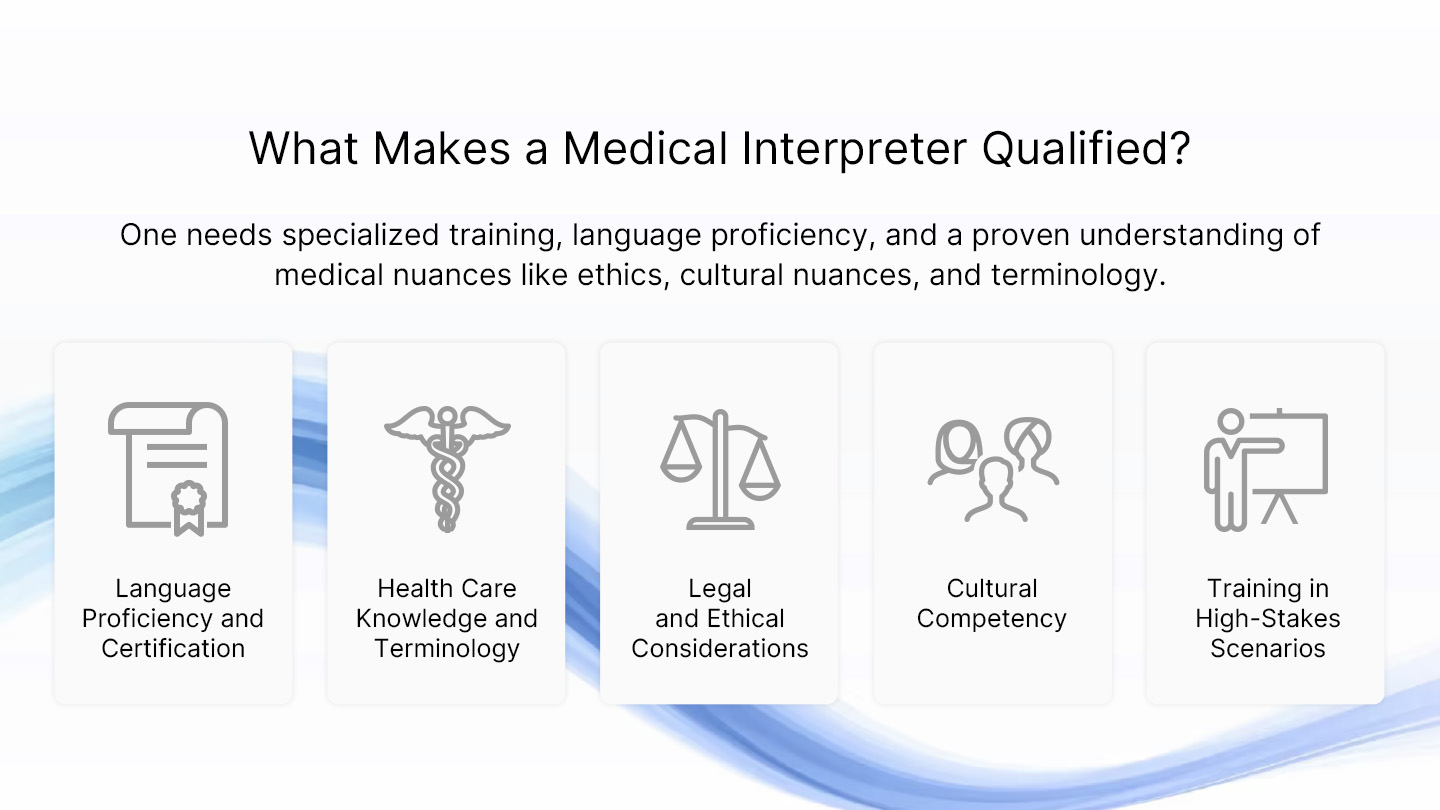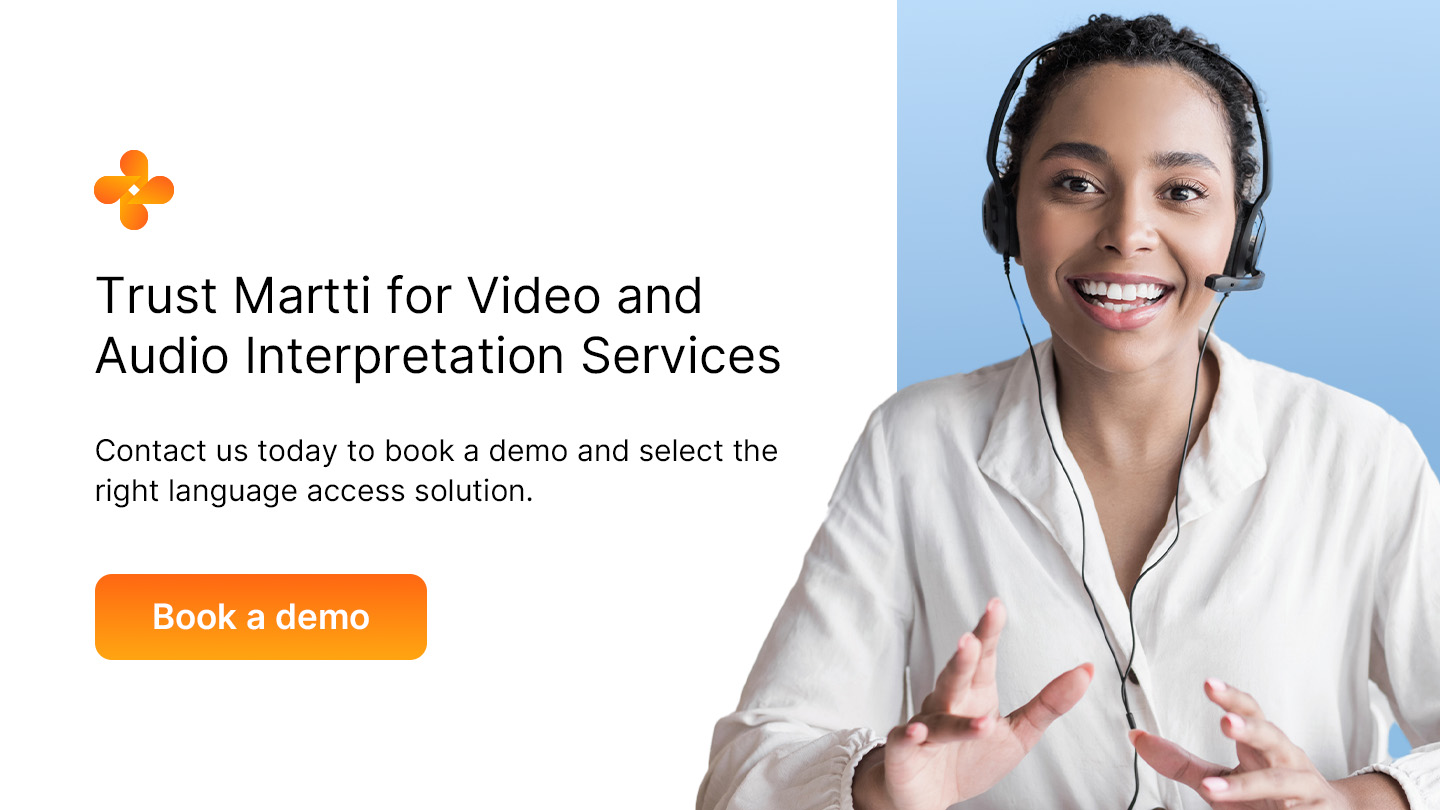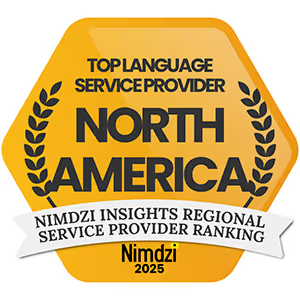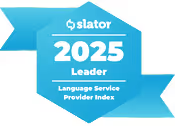Unqualified interpretation, whether through a bilingual staff member, family member, or untrained interpreter, risks patient safety and legal compliance. Clear communication is essential in healthcare because mistakes in translation can lead to a misdiagnosis, the wrong treatments, or lack of informed consent. This opens the door to malpractice claims and regulatory violations for healthcare providers.
Working with a qualified medical or healthcare interpreter improves patient outcomes and ensures regulatory compliance. As such, providers can focus on care instead of working around language barriers.
What Is a Medical Interpreter?
A medical interpreter is a professional trained to help “health-related communication between patients, accompanying persons and treatment providers, or administrators who do not use the same language” (ISO, 2020, 3.3.3). These professionals are essential, as 8% of individuals 5 years or older in the U.S. have limited English proficiency (LEP).
Medical interpreters ensure accurate, complete, and confidential interpretation in healthcare settings, lowering the chances of miscommunication that can lead to misdiagnoses and treatment or consent mistakes.
What Does a Medical Interpreter Do?
A qualified medical interpreter assumes the following responsibilities:
- They support the communicative autonomy of all parties in a conversation.
- They follow strict protocols and national standards of practice to manage each interpreting session approprietly.
- They adhere to the national code of ethics.
- They convey everything said, signed, and communicated through non-verbal gestures, even if it is emotional or uncomfortable.
- They undergo regular training to stay on top of changing medical terminology and interpreting practices.
What Makes a Medical Interpreter Qualified?
Not all bilingual people can work as medical interpreters. To provide interpreting services in compliance with the Affordable Care Act, with high levels of accuracy and customer service, and to work with a reputable company doing medical interpretation, one needs to be qualified as a healthcare interpreter. That means interpreters need to demonstrate that they have “been evaluated as competent in two or more languages after meeting standards for interpreting knowledge and skills [...]” (Allen et all., 2023). They also receive specialized training and have a proven understanding of ethics, cultural nuances, and healthcare terminology and knowledge.

1. Language Proficiency
Interpreters must be fluent in English and at least one non-English language, being able to sign or speak, listen, and understand medical terms in both.
2. Health Care Knowledge and Terminology
A medically qualified interpreter understands healthcare vocabulary, procedures, anatomy, medications, and diagnoses. They also know about essential pharmacology, pathophysiology of common medical conditions, and diagnostic procedures. For example, a general interpreter may not know the difference between a heart attack and cardiac arrest. However, a trained medical interpreter knows the difference and can communicate it effectively.
Interpreters also understand health care systems, policies, and workflows. They understand informed consent and the Health Insurance Portability and Accountability Act (HIPAA) regulations. This information lets them support the privacy and confidentiality of the information shared by patients and providers. It also protects your facility against potential penalties for violations.
3. Legal and Ethical Considerations
Qualified medical interpreters adhere to strict ethical principles including:
- Confidentiality: Medical interpreters protect patient privacy.
- Impartiality: They refrain from counseling, advising, or projecting personal biases and beliefs, and do not influence medical decisions.
- Accuracy: They convey the content and spirit of the original message, taking into consideration its cultural context, without omitting and changing anything.
- Professionalism: They act in a professional and ethical manner at all times and strive to continually gain knowledge and skills.
4. Cultural Sensitivity and Awareness
Cultural beliefs impact what, when, and how we say things as well as how we listen and perceive information. A skilled healthcare interpreter understands that cultural misunderstandings may cause communication breakdowns, and they are trained to ask, mediate or intervene to alert all parties of a potential misunderstanding due to cultural differences while supporting the communicative autonomy of each person in a conversation.
5. Training in High-Stakes Scenarios
Medical interpreters are trained for sensitive and emergency situations, including end-of-life discussions, mental health crises, informed consent for surgery, and complex diagnoses. They are also trained in communicating prognosis, treatment options, and the next steps as well as signs and symptoms, which reduces confusion, emotional distress, and risks.
How to Choose Qualified Medical Interpreters for Your Healthcare Facility
Language barriers can cause various problems for healthcare facilities, from low patient satisfaction to frustration, malpractice cases, and improper treatments. The National Council on Interpreting in Health Care (NCIHC) offers some key requirements for partnering with qualified medical interpreters:
- Training: A qualified medical interpreter must demonstrate proficiency in both English and their non-English language. They need formal training in medical terminology, ethical decision-making, and interpreting best practices.
- Experience: Medical interpreting includes an understanding of clinical workflows, patient-provider dynamics, and medical nuances. Interpreters should have experience in hospitals, emergency rooms, mental health services, and public health programs.
- Legalities: Ensure compliance with federal laws like Title VI of the Civil Rights Act and Culturally and Linguistically Appropriate Services (CLAS) standards.
- Modality: Video remote interpretation (VRI) is ideal for urgent needs, round-the-clock calls, and healthcare in remote locations. Ensure you have a stable internet connection.
Why Trust Us?
At Martti, we understand medical interpretation is about more than communicating between languages. It is about forming a connection between the patient and provider through a third party who understands both sides and can anticipate everyone's communication needs. Our interpreters deliver more than reliable, precise health care communication.
Each qualified medical interpreter has over 120 hours of training and additional continuing education. We conduct routine monitoring and coaching, and require a minimum Level 3 score in the Interagency Language Roundtable (ILR) scale.
We offer over 250 languages, including American Sign Language (ASL).
Trust Martti for Video and Audio Interpretation Services
Qualified medical interpreters are a critical part of delivering safe, effective, and fair healthcare. If your facility relies on interpretation, ensuring access to professionally trained interpreters, not just bilingual staff, is essential. By prioritizing trained, ethical, and experienced medical interpreters, your organization can improve patient outcomes, reduce risk, and foster a more inclusive healthcare environment.
Connect with our qualified medical interpreters in 20 seconds or less and enjoy VRI with freedom and simplicity when you use one of our Martti carts, which are designed to meet healthcare environments' needs. Our app seamlessly integrates with EHR systems to save you time. With a one-click launch, automatic documentation, smart language selection, and simplified billing processes, you will see the difference in organizational efficiency and patient satisfaction.
Contact us today to book a demo and select the right language access solution.

Linked Sources
- https://www.kff.org/racial-equity-and-health-policy/issue-brief/overview-of-health-coverage-and-care-for-individuals-with-limited-english-proficiency/
- https://www.asahq.org/education-and-career/asa-medical-student-component/a-quick-guide-to-medical-interpreters-in-healthcare-and-anesthesiology
- https://cchicertification.org/
- https://www.certifiedmedicalinterpreters.org/
- https://www.hhs.gov/hipaa/for-professionals/privacy/laws-regulations/index.html
- https://www.ncihc.org/assets/z2021Images/NCIHC National Code of Ethics.pdf
- https://www.martti.io/interpreters
- https://www.ncihc.org/faq-healthcare-professionals
- https://www.justice.gov/crt/fcs/TitleVI
- https://www.federalregister.gov/documents/2000/08/16/00-20938/improving-access-to-services-for-persons-with-limited-english-proficiency
- https://thinkculturalhealth.hhs.gov/clas
- https://www.govtilr.org/Skills/AdoptedILRTranslationGuidelines.htm
- https://www.ncihc.org/
- https://www.martti.io/case-studies
- https://www.martti.io/contact










